Seagate's Momentus XT Reviewed, Finally a Good Hybrid HDD
by Anand Lal Shimpi on May 24, 2010 9:31 AM EST- Posted in
- Storage
- SSDs
- Seagate
- Momentus XT
- Hybrid Drive
- SSHDs
Overall System Performance using PCMark Vantage
Next up is PCMark Vantage, another system-wide performance suite. For those of you who aren’t familiar with PCMark Vantage, it ends up being the most real-world-like hard drive test I can come up with. It runs things like application launches, file searches, web browsing, contacts searching, video playback, photo editing and other completely mundane but real-world tasks. I’ve described the benchmark in great detail before but if you’d like to read up on what it does in particular, take a look at Futuremark’s whitepaper on the benchmark; it’s not perfect, but it’s good enough to be a member of a comprehensive storage benchmark suite. Any performance impacts here would most likely be reflected in the real world.
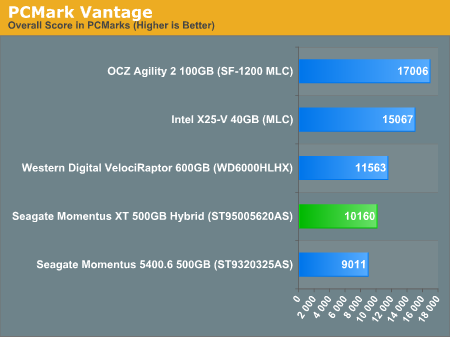
The PCMark Vantage Suite puts the Momentus XT smack in the middle of the 5400.6 and the VelociRaptor. The individual suites generally tell a similar story, although in some cases the drive actually outperforms the VelociRaptor.
The memories suite includes a test involving importing pictures into Windows Photo Gallery and editing them, a fairly benign task that easily falls into the category of being very influenced by disk performance.
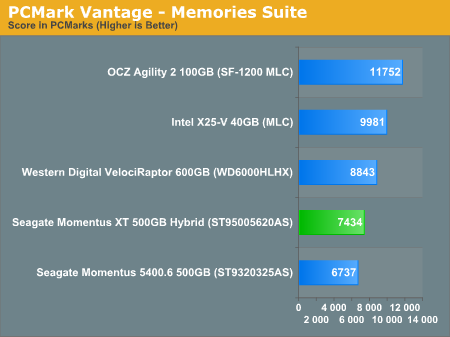
The TV and Movies tests focus on on video transcoding which is mostly CPU bound, but one of the tests involves Windows Media Center which tends to be disk bound.
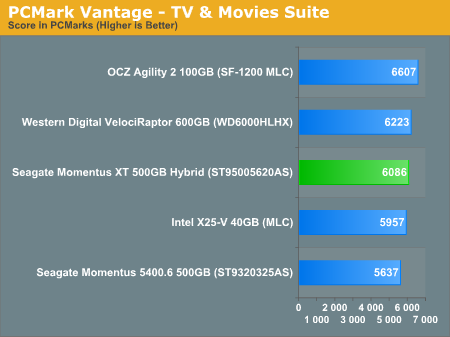
The gaming tests are very well suited to SSDs since they spend a good portion of their time focusing on reading textures and loading level data. All of the SSDs dominate here, but as you'll see later on in my gaming tests the benefits of an SSD really vary depending on the game. Take these results as a best case scenario of what can happen, not the norm.
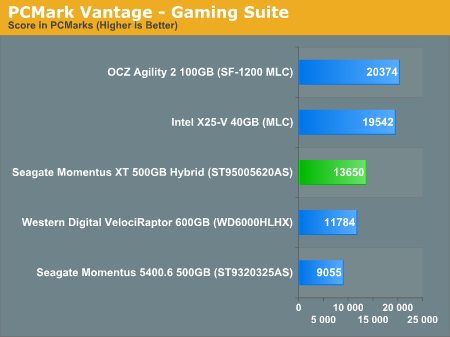
In the Music suite the main test is a multitasking scenario: the test simulates surfing the web in IE7, transcoding an audio file and adding music to Windows Media Player (the most disk intensive portion of the test).

The Communications suite is made up of two tests, both involving light multitasking. The first test simulates data encryption/decryption while running message rules in Windows Mail. The second test simulates web surfing (including opening/closing tabs) in IE7, data decryption and running Windows Defender.
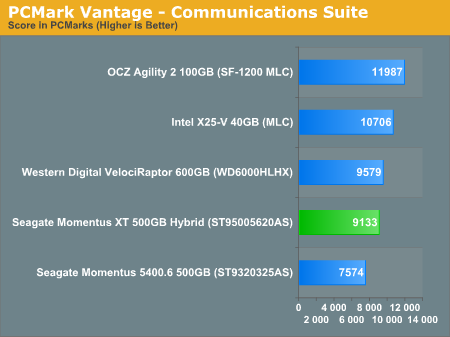
I love PCMark's Productivity test; in this test there are four tasks going on at once, searching through Windows contacts, searching through Windows Mail, browsing multiple webpages in IE7 and loading applications. This is as real world of a scenario as you get and it happens to be representative of one of the most frustrating HDD usage models - trying to do multiple things at once. There's nothing more annoying than trying to launch a simple application while you're doing other things in the background and have the load take forever.
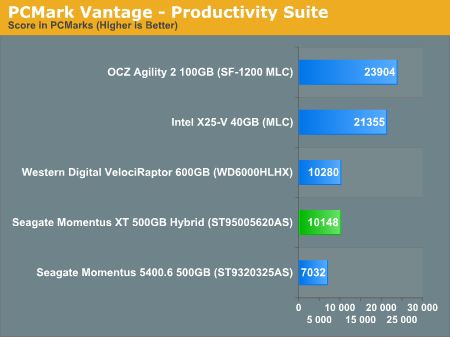
The final PCMark Vantage suite is HDD specific and this is where you'll see the biggest differences between the drives:
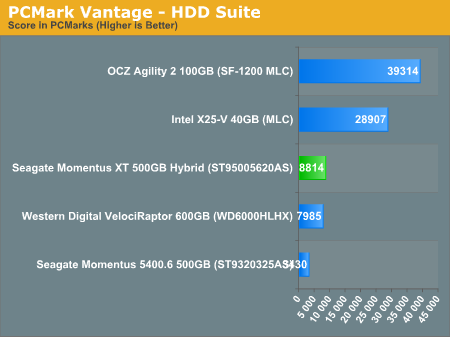










120 Comments
View All Comments
numberoneoppa - Monday, May 24, 2010 - link
As much as I miss my girlfriend who's been on the other side of the world for two weeks... I've missed you more, Anand.Welcome back.
SandmanWN - Monday, May 24, 2010 - link
That's just weird...Anand Lal Shimpi - Monday, May 24, 2010 - link
HAHA that's awesome. well, not for your girlfriend.Take care,
Anand
weakerthans4 - Monday, May 24, 2010 - link
There are some itches a girlfriend just can't scratch... Welcome back Anand!!!!quiksilvr - Wednesday, May 26, 2010 - link
Please stop saying things.falc0ne - Tuesday, July 6, 2010 - link
aaa..lol? :))DoktorSleepless - Monday, May 24, 2010 - link
Why wasn't a regular 7200 rpm drive used as another reference point? That would have been nice to have as well.Anand Lal Shimpi - Monday, May 24, 2010 - link
I mentioned this on the test page, I simply didn't have a modern 7200RPM 2.5" drive on hand (only older 7200RPM 2.5" drives which were slower than the 5400.6) while I was conducting these tests. As I put together the data for our HDD bench I will add them in though :)Between the 5400.6 and the WDVR you should be able to get a good idea of where this thing falls though.
Take care,
Anand
LoneWolf15 - Monday, May 24, 2010 - link
Yeah, the one thing though is that having, say, a normal Momentus 7200 would allow us to tell if the NAND is really offering us a benefit over a drive without it, and if so, what percentage performance increase can be attributed to it.I understand you didn't have the drive at this time, but if you could update this article in the future, it would be much appreciated.
pcfxer - Tuesday, May 25, 2010 - link
The issue with that line of thinking is that this drive is not just HDD+SSD, the algorithms that the drive uses to read and write data is on a vastly different ball field. This drive is an HDD with SSD capabilities and sometimes benefits.Until everyone understands that, they (consumers) will expect SSD performance at least some of the time, which is a result of poor understanding. Of course, after all the technical articles on SSDs and as a result HDDs, I'm amazed that people would ever expect any SSD performance from a HDD with flash. The flash is just like nitrous in a car; a 100 shot doesn't offer 100hp, but maybe 60hp instead. A good poke, but not the real thing.